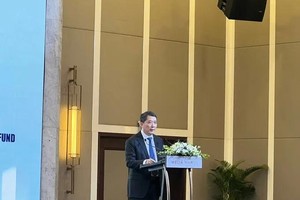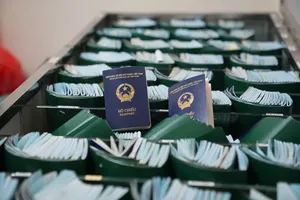 |
Global foreign currency fluctuations cause difficulties in monetary management policy |
From the beginning of the year until now, the State Bank has maintained a loose monetary policy to support the economy. However, despite the State Bank of Vietnam’s efforts in the implementation of many solutions to increase access to capital for businesses, including reducing interest rates, the economic growth is not as good as expected as the economy's absorption is low, so credit growth in the first 9 months of 2023 will only increase by 6.92 percent compared to the end of 2022, only reaching 50 percent of the target set for this year.
Meanwhile, the stagnation of money in commercial banks is huge. Being a financial expert, General Director of WiGroup Data and Financial Technology Joint Stock Company Tran Ngoc Bau said that this has shown that businesses have not absorbed the credit capital.
Amid capital desorption, the exchange rate became tense again. Banks have abundant credit capital resulting in excess liquidity in the banking system and a sharp drop in inter-bank interest rates, putting pressure on the USD/VND price, whereas there is an upward trend in the USD. Recently, the USD/VND exchange rate at banks has continuously fluctuated, sometimes exceeding VND/USD24,600. Excess bank liquidity also leads to the huge interest rate difference between VND and USD. After the continuance of increased interest rates, the State Bank of Vietnam was forced to intervene to stabilize the exchange rate by issuing credits.
After 13 issuances of credits from September 21 to October 9, the State Bank has sucked VND145,700 billion out of commercial banks. This move aims to regulate liquidity in the short term; thereby, reducing pressure on the exchange rate. Although the exchange rate is currently reducing, the USD/VND exchange rate at domestic banks is still high with the published buying and selling rates at VND24,230 and VND24,570 a dollar respectively on October 10.
According to Head of Macroeconomics and Market Strategy at VNDirect Securities Company Dinh Quang Hinh, the interest rate difference between VND and USD continues to narrow due to the operating interest rate of the US Federal Reserve (FED) can remain stable until the end of 2023 to control inflation, while the SBV intends to continue lowering interest rates to support domestic growth and inflation.
The increase in the USD/VND exchange rate has led to pressure to repay foreign debt, especially in the private sector, and increased inflationary pressure due to increased prices of imported raw materials and consumer goods. Therefore, the greater the exchange rate pressure is, the narrower the room for loosening domestic monetary policy is, said Mr. Dinh Quang Hinh.
Credit growth is still at a low level, raising many concerns about achieving the growth target in 2023 of 6 percent-6.5 percent set by the Government. However, economic experts believed that while businesses have not fully recovered, and production and business activities are not improving, the government should strengthen the implementation of fiscal policies in addition to promoting the flow of credit capital for the economy. According to economist Dinh Trong Thinh, from now until the end of the year, fiscal policies such as a 30-percent reduction of land rent just issued by the Government and reductions of fees and VAT tax are needed to carry out to achieve the target economic growth.
















)

)





